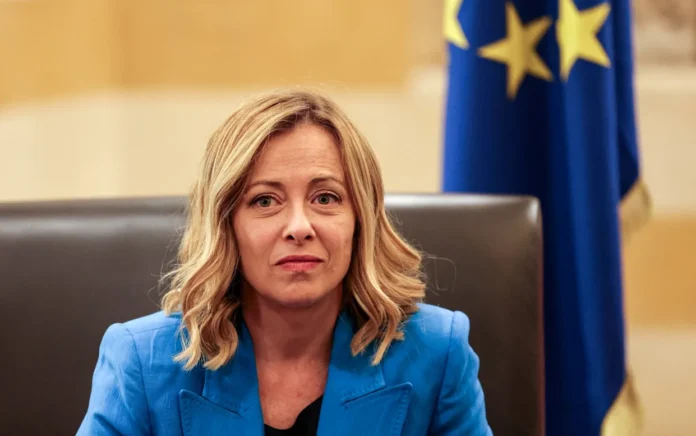Italian Prime Minister Giorgia Meloni issued a stern warning against the emergence of a “trade war within the West,” following U.S. President Donald Trump’s announcement of imposing 30% tariffs on products imported from the European Union and Mexico, effective August 1, 2025. Meloni’s statement reflects growing concerns about the economic and geopolitical consequences of escalating trade tensions between major Western allies. Her remarks underscore the delicate balance Europe must strike to maintain economic stability while navigating political pressures both domestically and internationally.
Background on the Tariff Announcement
The announcement from the U.S. administration to impose a 30% tariff on EU and Mexican goods has sparked significant alarm across the Atlantic. This move is perceived as a response to trade imbalances and is part of a broader U.S. policy shift toward protectionism. The tariffs, set to take effect in less than three weeks, could affect a wide range of industries, from European automobiles and luxury goods to agricultural products, potentially disrupting supply chains and increasing costs for consumers on both sides of the Atlantic.
Meloni, a prominent figure in European politics and leader of Italy’s far-right Brothers of Italy party, emphasized the risks of retaliatory trade measures. In a statement released by her office, she cautioned, “A trade war within the West would weaken us all in the face of the global challenges we are confronting together.” She argued that such a conflict could undermine the collective strength of Western economies at a time when global competition, particularly from non-Western powers, is intensifying.
Meloni’s Call for Cooperation
Meloni advocated for a diplomatic approach, urging Europe to leverage its “economic and financial strength to assert its position and reach a fair and sensible agreement” with the United States. Her call for dialogue reflects Italy’s strategic position as a mediator within the EU, seeking to avoid escalation while protecting European interests. She stressed that Italy would “do its part” to facilitate negotiations and prevent a spiral of retaliatory tariffs that could harm global markets.
This stance comes amid pressure from other EU member states, notably France and Germany, which are reportedly pushing for a stronger response, including the use of the EU’s new anti-coercion tool to counter U.S. tariffs. Meloni, however, has resisted calls for aggressive retaliation, positioning herself as a voice of moderation. Posts on X indicate that she canceled her scheduled agenda to focus on diplomatic efforts to avert a trade war, highlighting her commitment to finding a resolution.
Domestic and International Reactions
Meloni’s cautious approach has not been without criticism. In Italy, opposition parties, including the Five Star Movement led by Giuseppe Conte, have accused her of being too conciliatory toward Washington. Conte claimed that Meloni was “bowing her head” to U.S. threats, a charge that reflects the domestic political challenges she faces as she navigates this crisis. Her far-right government has been under scrutiny for balancing its nationalist rhetoric with the need for international cooperation, particularly within the EU and with the U.S.
Internationally, Meloni’s position has drawn attention for its pragmatic tone. Posts on X from sources like @Cointelegraph and @inteltower reflect sentiment that Meloni views U.S. tariffs as misguided and is actively working to avoid a broader conflict. Her stance has also put her at odds with some EU partners, who see her reluctance to support immediate retaliatory measures as a potential weakness in the EU’s unified response. The Financial Times reported that Meloni is under pressure to “choose a side” in the transatlantic trade dispute, given Italy’s influential role in EU decision-making.
Economic Implications
The proposed U.S. tariffs could have far-reaching effects on the European economy, which is already grappling with inflationary pressures and supply chain disruptions. A trade war could exacerbate these challenges, leading to higher prices for consumers and reduced competitiveness for European exporters. Italy, with its significant automotive and luxury goods sectors, stands to lose considerably if tariffs are implemented without a negotiated resolution.
Meloni’s earlier comments, reported by Bloomberg in March 2025, highlighted her concerns about tariffs fueling inflation, a point she reiterated in her recent statement. The potential for a trade war to weaken the West’s economic cohesion is particularly concerning given the global challenges Meloni referenced, such as competition from emerging markets and ongoing geopolitical tensions.
Broader Context
Meloni’s warning comes at a time when the West is navigating multiple crises, including energy security, technological competition, and geopolitical rivalries. A trade war within the West could undermine the unity needed to address these issues, potentially ceding ground to non-Western powers. Her emphasis on cooperation aligns with Italy’s historical role as a bridge between Europe and the U.S., but it also reflects the delicate balancing act required to maintain her government’s domestic support while upholding EU solidarity.
Italian Prime Minister Giorgia Meloni’s warning against a “trade war within the West” highlights the high stakes of the current U.S.-EU trade tensions. By advocating for dialogue and a fair agreement, Meloni is positioning Italy as a key player in efforts to de-escalate the situation. However, her approach has sparked domestic criticism and exposed divisions within the EU on how to respond to U.S. tariffs. As the August 1 deadline approaches, the international community will be watching closely to see whether Meloni’s diplomatic efforts can prevent a damaging trade conflict that could weaken the West’s global standing.



